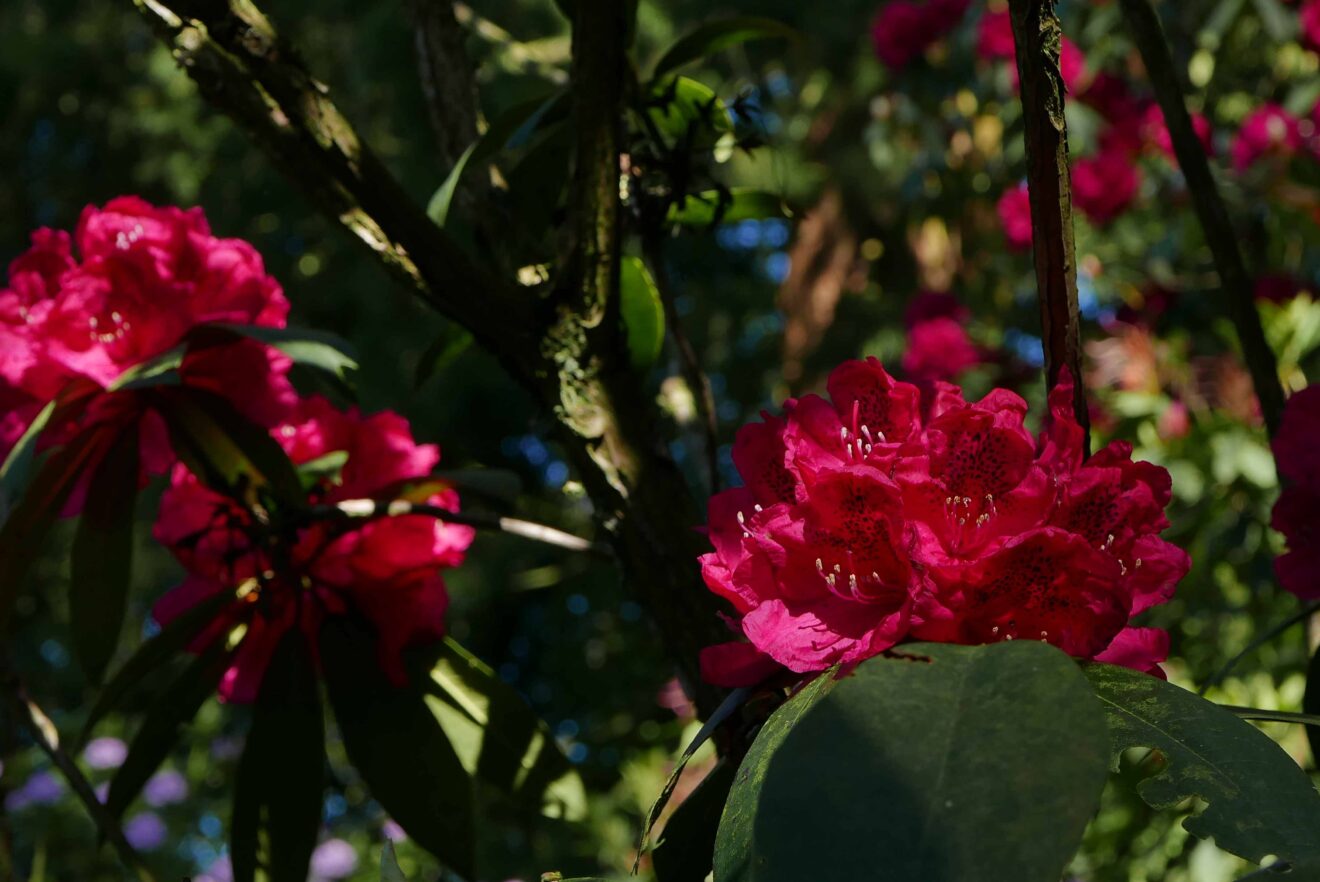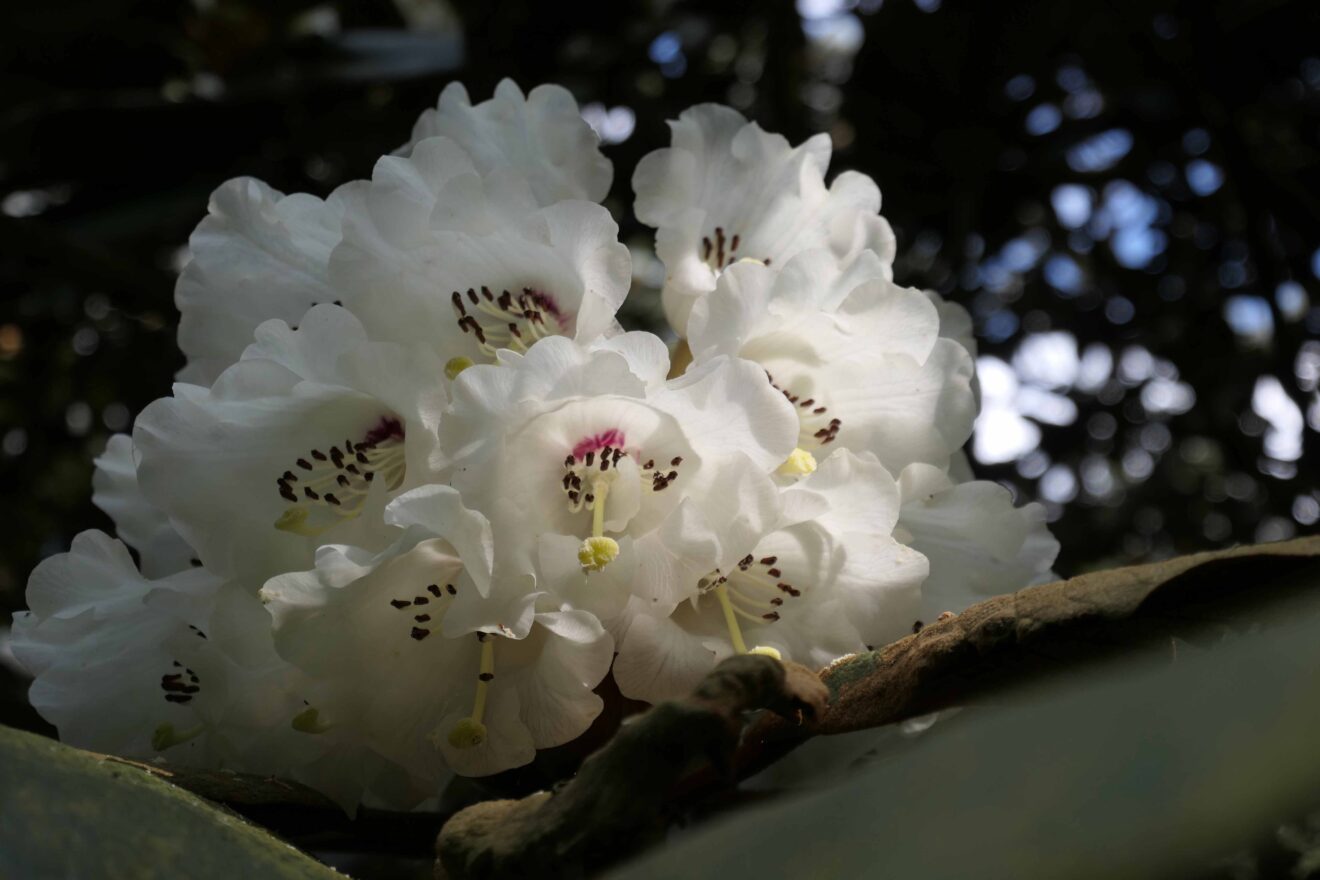The Book of Yourself Newsletter
Issue 5: April 2022
|

|
Spring has come to these latitudes with a sudden burst of beauty. The change in the energy was noticeable. Everything has been coming back to life from the tenebrous depths of winter. There was a sudden profusion, a burgeoning strength that was its own resurgence. The cherry trees exploded into blossom, tulips dotted the gardens with colour and the air was filled with the intoxicating scent of wisteria and lilac. It’s been such a joy to wander about and breathe the perfumed air. Rapeseed grows along the banks of the canals and their pungent scent coveys the full intensity of this fertile season. The cloudless skies have flooded the land with light. Flocks of geese graze in the fields and along the grassy dikes and are quick to take to the water with their young at the approach of people walking their dogs. The woods are gathering shade with their fast-growing canopies. The light sea breeze sets the branches into a gentle dance that releases the hidden laughter among the leaves. At dusk, the blackbirds celebrate the passing day with their consummate song, just as they welcomed it ecstatically at sunrise.
|
|
On Saturday 23rd, we held our last meeting of this first edition of The Book of Yourself. The original course schedule had finished a week before, but it felt rather unnatural to end this very human journey so abruptly. We then agreed to have an extra session to round it off on a more personal note. People were very appreciative of all the work that had gone into putting the course together and the intensity of inquiry and communication that we had managed to generate together. The participants were unanimously interested in keeping the course material. While I had already indicated that I would make it all available on the website for another month, what they really wanted was to have the actual file. This seemed more than fair to me, as the material was very rich in meaning and deserving a much closer and detailed study. It turned out that one of the participants had already created such a file for herself and she kindly offered to send it to the others, which was very much appreciated.
|
|
Some people were concerned about how this work could be carried forward. It just felt like a pity to break it off when there was so much more to it. One participant was particularly keen on this, as the course had a major impact on his life and way of thinking. It was then proposed that they could meet as a group for monthly dialogues and this proposal was warmly welcomed by most of them as a fitting continuation of the course. Going together into the fundamental issues of our existence in such a friendly and universalist spirit had made for an affective and very human closeness and it would be indeed a bit sad to leave it at that.
|
I knew from previous experience that this situation was likely to arise. The course impacts some people quite strongly and the conclusion of the scheduled curriculum terminates the process. When I first offered the course in-person six years ago, people asked for a follow-up. I came up with a proposal and we started a dialogue group, which I believe is still going on. I told the online group, however, that I could not take responsibility for it. Most of these activities happen on the weekend and my weekends are already full. So it was up to them to organise and sustain this dialogue group. They could always contact me, and I would be happy to participate whenever possible, but it was now in their hands.
|
We all thanked each other for this beautiful and inspiring journey together. I was a bit sad myself afterwards at having to take leave of such a serious and considerate group of fellow travelers. It had been a genuinely participatory endeavour. We had developed a beautiful spirit of communication and friendship and there was a natural sadness in seeing it come to an end. But although I would have loved to continue with the dialogue, I just could not ignore my limitations. Luckily, they will carry on with the work on their own. The group is very mature, and I think the course provides a good basis for undertaking such an adventure in learning.
|
|

|
Dialogue has become a regular aspect of the inquiry associated with K’s teachings. This is logical. After all, self-knowledge implies the observation and understanding of ourselves. It means that we are willing to take our idiosyncrasies directly in hand. At the same time, we are dealing with universal human issues and fundamental questions so that the inquiry weaves back and forth between the general and the particular. When K talks about reading the book of oneself, he means both the concrete aspects of one’s life as well as the universal dimension underlying them. This is the metaphor behind the structure and the title of the course, namely as a reading of the book of yourself, which is the book of humanity:
|
|
“To learn from books is important, but what is far more important is to learn from the book of the story of yourself, because you are all mankind. To read that book is the art of learning. It is all there – the institutions, their pressures, their religious impositions and doctrines, their cruelty, their faiths. The social structure of all societies is the relationship between human beings with their greed, their ambitions, their violence, their pleasures, their anxieties. It is there if you know how to look. The book is not out there or hidden in yourself; it is all around you; you are part of that book. The book tells you the story of the human being, and it is to be read in your relationships, in your reactions, in your concepts and values. The book is the very centre of your being, and the learning is to read that book with exquisite care. The book tells you the story of the past, how the past shapes your mind, your heart and your senses. The past shapes the present, modifying itself according to the challenge of the moment. And in this endless movement of time human beings are caught. This is the conditioning of man. This conditioning has been the endless burden of man, of you and your brother.”
|
(The Whole Movement of Life is Learning, pp. 98-99)
|
Krishnamurti’s teachings are such a reading, and their study reveals the scope and depth of the challenge that as human beings we represent for one another and for ourselves, namely the challenge of freedom from the endless burden of conditioning that is responsible for the general fragmentation and disorder in our lives. Dialogue explicitly embraces the common nature of the challenge so that it becomes a joint endeavour, for as human beings we are all in the same boat. This is already an important step in bridging the gap between us, as it involves an acknowledgement of our shared responsibility for what is going on in the world. In the booklet Reflecting Consciousness – An Overview of Dialogue (2017)[1], I did my best to synthesize a coherent vision of the dialogue proposal. Admittedly, this was something of a cut-and-paste job on my part, as I drew heavily on K and especially Bohm for its overall content. However, this was not, strictly speaking, a theoretical exercise since my experimentation with dialogue had amply demonstrated both the logical soundness of the proposal and its actual transformative potential. That is why I consider it one of the most intelligent contributions to the understanding of consciousness and a natural complement to the study of the teachings.
|
Given the general condition of fragmentation of human beings, such a proposal is fraught with dangers. There is practically no word that does not lend itself to misunderstanding and contradiction. But this is not only what is to be expected but the manifestation of the very phenomenon of fragmentation that we mean to probe into and understand. It calls for a great deal of patient listening and, above all, self-awareness. Our conditioning is not some abstract programming that we can change at will but is deeply rooted in our consciousness, not only through education and experience but through various psychological patterns of pleasure, hurt and fear. What we are attempting to see through and understand is the very structure and content of the conditioned reflex movement of thought. Therein lies its danger, for it bypasses our awareness, thus leading to division and conflict. The significance of dialogue lies in its potential to reveal the process of fragmentation implicit in the reflex operation of thought-feeling, freedom from which is fundamental for wholeness and creativity.
|
Dialogue is essentially experimental, and it lends itself to any number of formats and approaches. Above all, it appeals to our intent to wholeness, to our urgency and sensitivity in dealing with the immediate as well as fundamental challenges of living. It is not a formulaic technique but an art requiring close attention and hesitant probing. It is itself the subject of a great deal of ongoing reflection as to its nature, especially among different dialogue practitioners. The summary I came up with at the end of the above booklet, could perhaps serve as a general description. Some of its key aspects, in brief, include the following:
|
- Dialogue implies a sharing of meaning through the spoken word. It is a space in which to expose and observe the assumptions, values and intentions that control our thinking and behaviour. This requires a great deal of respect, care and attention.
- The crises facing humanity can be traced to a pervasive incoherence in the process of thought. Generally, we lack awareness of how thought functions. Dialogue serves to reflect the patterns of thinking-feeling so they can be observed.
- Dialogue offers a microcosm of the relationship of individual and society in which the fault lines of the general culture and its subcultures can be displayed.
- No content is excluded. There is no specific goal or direction, no imposed consensus or attempt to avoid conflict. As people share meaning, a common content of consciousness emerges which brings about a sense of impersonal fellowship.
- It is a conversation among equals. Hierarchy, conviction and persuasion have no place in it. However, some facilitation may be initially necessary to get it going.
- It is no panacea. It will not be meaningful for everyone nor useful in all contexts. The spirit of dialogue is one of free play opening the way to creative change.
- This approach to dialogue holds the potential for a significant transformation of consciousness. It is something new of vital importance for the general welfare of humanity and the creation of a new and wholesome culture.
Our consciousness is the universal history of humanity, and we need to read if we are to find the quality of creative order, peace and solidarity that we so desperately need. As the book is common to all of us, reading it together is the sane and responsible thing to do. And that’s why I would like to invite you all to explore it in your own lives and in your own way.
|
Be well and enjoy the resurgent strength and beauty of Spring,
|
[1] For those who might be interested, the booklet is available on the website www.thebookofyourself.com.
|
Photos: F. Grohe
|
|
|
|
|
|
|
|